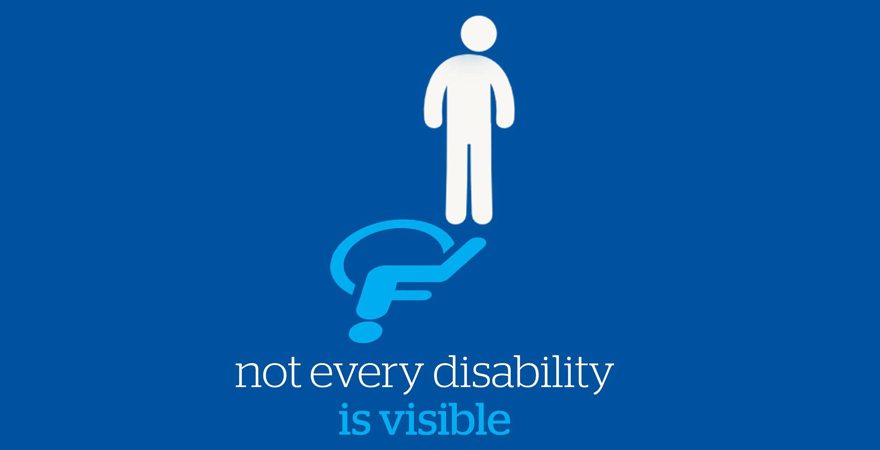By Karen Christine Patrick
One thing learned in the caregiver realm is the range and types of disabilities and illnesses that require somebody to help, or preclude people from what is considered “normal” activities. Assessments for the levels of disability are very extensive, and most certainly go through daily activities that can be done by the person or where they need some help.
The picture in the mind that comes with the word “disability” is somebody with something visible. One of the things that happened that often made me cringe when going out socially with my daughter in her wheelchair is that some well-meaning, curious person would ask, “What’s WRONG with her?” I would say, “Nothing is WRONG with her, but she was born with a condition (etc.) and maybe share a few things, but that is the motif in many people’s minds that they see someone using things like these heavy-duty wheelchairs, cane, walker, something like that and something is WRONG. Which could result in helpful behavior, well-meaning, getting help with doors, or people making some space in the front for us. And my daughter’s condition was visible. Once I got frustrated with one the agencies I had to deal with not realizing she was an actual person, not a theoretical one, and took her out for a day out of school to bring her to said office, make them have to make space in the office for her in her wheelchair as “Exhibit A” … I really hated having to do that but I was at my wit’s end with the “deciders” in that office and this did get results.
I myself became disabled, but mine came on gradually and fit into the category of “Invisible Disabilities” and I became aware of an organization for people who “don’t look sick” as one writer put it. People in this category of disability often experience it that it’s much harder to get help or services because there is nothing to “show for it” as what happened in my Exhibit A story. Certainly, people with mental illness, don’t necessarily have physical traits to show for it. If you encounter someone with a hearing disability, you may not realize it until you notice their hearing aids. Furthermore, you might not recognize the difficulties that they face and the increased costs they have to incur when changing the batteries (if you’re interested in better alternatives, check out https://www.earpros.com/uk/hearing-aids/hearing-aid-batteries here), as well as how they lead their lives on daily basis. For cancer patients, until they are going through the visible effects of treatment, many other disorders and diseases do not “show”. There are so many people who have disorders or conditions that have no visible signs, but that doesn’t mean we can ignore or minimize their suffering. So many people struggle with disorders and conditions that may not have any physical signs, but it still doesn’t mean that we can question them about it or disregard their illness. Some of these invisible disabilities, such as mental health issues, can really affect an individual’s life. In fact, some of them even have to visit PureHempFarms online to purchase some hemp to help them manage their mental illness, so it’s important that they receive the support that they need.
Where the Basic Income Guarantee comes in is to not put people in that agonizing position of having to “prove” they are sick enough for help. They can work through their disability issues or recovery issues with dignity, having a basic way to live and not have that worry added onto the stress of what is already going on with their health. Some people have intermittent visitations of their conditions, not knowing when they are going to have debilitating bouts. Again, not fully disabling all the time, but enough during the bad times to preclude working full-time.
There is much talk in the B.I.G. advocacy community of robotics replacing jobs and that a basic income is to be the logical response to technological unemployment. To this I heartily agree because most employers have looked to their workers as “human resources” which seems an impersonal term that implies that some how people are “units” that don’t break down. Our bodies are not robotic, they can break down. Our minds, especially in this precarious age, also can suffer injury just from the stress of uncertainty as we are in times that are a changin’.
We can affect a dignified change, we can acknowledge the humanity in our changes by choosing the Basic Income Guarantee to bridge the gap between living and work as we knew it.
For more about the Invisible Disabilities Association go to invisibledisabilities.org.
For more from Karen Christine Patrick, visit her blog.



I do hope the discussion of basic support includes an income high enough to replace public housing schemes and is sufficient to allow people with disabilities to hire support for life or a rehabilitation or recovery period.